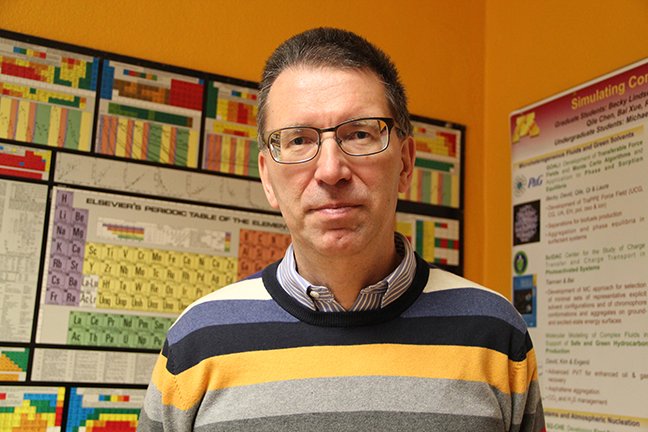Professor Siepmann named editor-in-chief of Journal of Chemical & Engineering Data

The Publications Division of the American Chemical Society (ACS) has named J. Ilja Siepmann, Ph.D., of the University of Minnesota editor-in-chief of the Journal of Chemical & Engineering Data.
Siepmann has been on the faculty at the University of Minnesota since 1994, where he is a professor in the Department of Chemistry and a member of the graduate faculties in chemical physics, chemical engineering, and materials science. There, his research group focuses on particle-based computer simulations to understand how molecular architecture and composition influence structure, phase behavior, and function of the system of interest. The Siepmann group has developed transferable force fields and efficient Monte Carlo algorithms that predict both accurate and precise thermodynamic data for a wide range of chemical systems, including those for which experimental data are not readily accessible. Siepmann also serves as the director of the Nanoporous Materials Genome Center funded by the US Department of Energy.
He is a fellow of the American Institute of Chemical Engineers and the American Physical Society. In 2018, he received the Yeram S. Touloukian Award from the American Society of Mechanical Engineers for outstanding technical contributions in the field of thermophysical properties. Siepmann undertook his undergraduate studies in chemistry at the University of Freiburg and obtained a Ph.D. in chemistry from the University of Cambridge. He has been an associate editor of the Journal of Chemical & Engineering Data since 2015. As editor-in-chief, Siepmann will succeed Joan F. Brennecke, Ph.D., who has served in this position since 2010.
“My vision for the Journal of Chemical & Engineering Data is to make it the preeminent journal in the thermophysical data field,” says Siepmann. “The journal will stand out as the most trusted source for accurate, precise, and reproducible thermophysical data, enhancing standards of research and shaping the future directions of the thermophysical data field while advancing the chemical sciences and their technological chemical processes.”
First introduced in 1959, the Journal of Chemical & Engineering Data is the only ACS title that focuses on data on the phase behavior and the physical, thermodynamic, and transport properties of well-defined materials, including complex mixtures of known compositions. The journal’s scope further includes thermophysical properties acquired through computational quantum chemistry, molecular simulations, and molecular mechanics calculations. With over 23,000 citations and 600 publications in 2019, Journal of Chemical & Engineering Data ranks in the top of its field.
“It’s wonderful to welcome Professor Siepmann as editor-in-chief of the Journal of Chemical & Engineering Data,” says James Milne, Ph.D., president, ACS Publications Division. “He will be an enthusiastic advocate for the journal’s scientific rigor and reputation, and seize opportunities to grow the computational area of JCED. I look forward to his ideas cultivating the journal even further to best serve the chemistry and engineering communities.”
The Department of Chemistry has a number of faculty members who serve as editors of scientific journals, including three editors-in-chief—Mark Distefano, editor-in-chief of Bioorganic Chemistry, Gunda Georg, editor-in-chief for the Journal of Medicinal Chemistry, and Marc Hillmyer, editor-in-chief of Macromolecules. It also has two co-editors, and seven associate editors of 8 publications, including Philippe Buhlmann associate editor of Analytical Sciences and TrAC Trends in Analytical Chemistry; Peter Carr, co-editor of Advances in Chromatography; Gunda Georg, co-editor of Topics in Medicinal Chemistry; Daniel Harki, associate editor of Medicinal Research Reviews; Carrie Haskell-Luevano, associate editor of Journal of Medicinal Chemistry; Christy Haynes, associate editor of Analytical Chemistry, and Theresa Reineke, associate editor of ACS Macro Letters. In addition, eight faculty members serve on the advisory boards of 14 scientific journals.
The American Chemical Society (ACS) is a nonprofit organization chartered by the U.S. Congress. ACS’ mission is to advance the broader chemistry enterprise and its practitioners for the benefit of Earth and its people. The Society is a global leader in providing access to chemistry-related information and research through its multiple research solutions, peer-reviewed journals, scientific conferences, eBooks and weekly news periodical Chemical & Engineering News. ACS journals are among the most cited, most trusted and most read within the scientific literature; however, ACS itself does not conduct chemical research. As a specialist in scientific information solutions (including SciFinder® and STN®), its CAS division powers global research, discovery and innovation. ACS’ main offices are in Washington, D.C., and Columbus, Ohio.